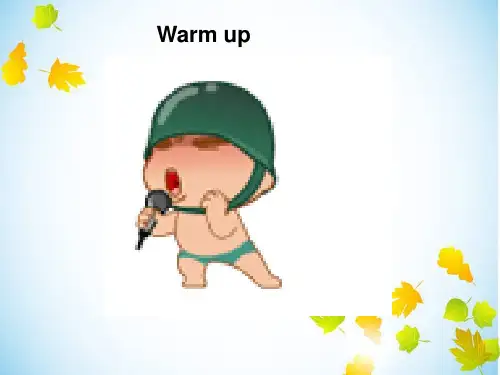新概念英语第一册第71课
- 格式:ppt
- 大小:3.40 MB
- 文档页数:40

新概念英语71课单词新概念英语第71课的单词包括:
1. Prosperous.
2. Unemployment.
3. Inflation.
4. Deflation.
5. Recession.
6. Recovery.
7. Economic.
8. Downturn.
9. Boom.
10. Slump.
"Prosperous" 意为“繁荣的”,"Unemployment" 意为“失业”,"Inflation" 意为“通货膨胀”,"Deflation" 意为“通货紧缩”,"Recession" 意为“经济衰退”,"Recovery" 意为“复苏”,"Economic" 意为“经济的”,"Downturn" 意为“衰退”,"Boom" 意为“繁荣”,"Slump" 意为“暴跌”。
这些单词是与经济和金融相关的,掌握它们可以帮助我们更好地理解和讨论与经济相关的话题。
在学习这些单词时,可以结合实际情境进行练习,例如阅读相关的经济新闻或文章,以加深对这些单词的理解和记忆。
同时,也可以通过与他人讨论经济话题的方式来运用这些单词,从而加深记忆。
希望这些单词对你的学习有所帮助。
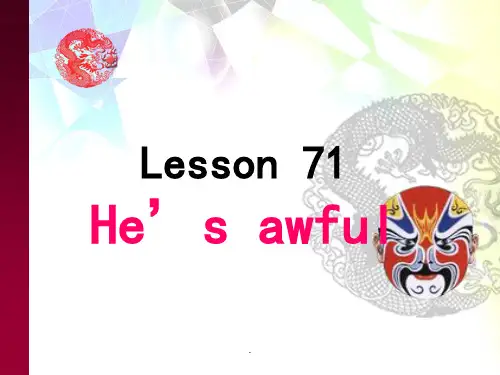
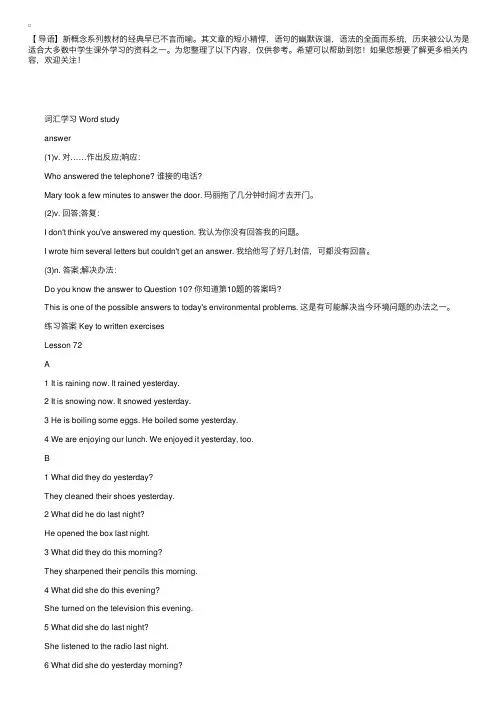
【导语】新概念系列教材的经典早已不⾔⽽喻。
其⽂章的短⼩精悍,语句的幽默诙谐,语法的全⾯⽽系统,历来被公认为是适合⼤多数中学⽣课外学习的资料之⼀。
为您整理了以下内容,仅供参考。
希望可以帮助到您!如果您想要了解更多相关内容,欢迎关注! 词汇学习 Word study answer (1)v. 对……作出反应;响应: Who answered the telephone? 谁接的电话? Mary took a few minutes to answer the door. 玛丽拖了⼏分钟时间才去开门。
(2)v. 回答;答复: I don't think you've answered my question. 我认为你没有回答我的问题。
I wrote him several letters but couldn't get an answer. 我给他写了好⼏封信,可都没有回⾳。
(3)n. 答案;解决办法: Do you know the answer to Question 10? 你知道第10题的答案吗? This is one of the possible answers to today's environmental problems. 这是有可能解决当今环境问题的办法之⼀。
练习答案 Key to written exercises Lesson 72 A 1 It is raining now. It rained yesterday. 2 It is snowing now. It snowed yesterday. 3 He is boiling some eggs. He boiled some yesterday. 4 We are enjoying our lunch. We enjoyed it yesterday, too. B 1 What did they do yesterday? They cleaned their shoes yesterday. 2 What did he do last night? He opened the box last night. 3 What did they do this morning? They sharpened their pencils this morning. 4 What did she do this evening? She turned on the television this evening. 5 What did she do last night? She listened to the radio last night. 6 What did she do yesterday morning? She boiled an egg yesterday morning. 7 What did they do yesterday afternoon? They played a game yesterday afternoon. 8 What did he do in the morning the day before yesterday? He stayed in bed in the morning the day before yesterday. 9 What did she do yesterday evening? She telephoned her husband yesterday evening. 10 What did she do the night before last? She called the doctor the night before last.。
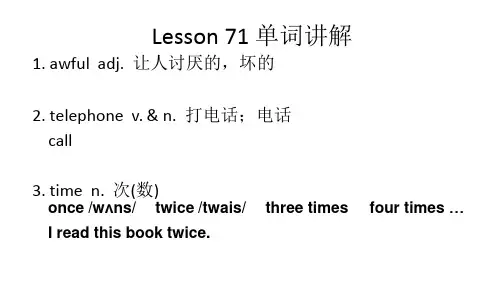
Lesson 71 单词讲解1.awful adj. 让人讨厌的,坏的2.telephone v. & n. 打电话;电话call3.time n. 次(数)once /wʌns/ twice /twais/ three times four times …I read this book twice.4.a nswer v. 接(电话)answer the phonest adj. 最后的,前一次的last night / last week / last month / last year6.phone n. 电话7.again adv. 又一次地Very nice to see you again.8.say (said) v. 说say /sei/ said /sed/ says /sez/say VS speaksay 强调说话的内容She said hello to me.He said sorry to me.My mom always says “Life was like a box of chocolate…”speak 突出说话的方式或动作本身speak loudly speak slowly speak EnglishLesson 71 课文讲解What is the climate like?What is the weather like?He telephoned me again.yesterday evening last nightLesson 71 语法讲解He was in the office.Was he in the office?Yes, he was. No, he wasn’t.He wasn’t in the office.Where was he?Who was in the office?There was a car race in our town in 1998. Was there a car race in our town in 1998? There wasn’t a car race in our town in 1998. What was there in our town in 1998?He went to school yesterday. do did /did/ Did wentDo he go he Do to school yesterday? ? e He like s coffee .He went to school yesterday. do notdid He donotgowent to school yesterday.He didn’t go to school yesterday.He went to school y e s t e r d a y. 他什么时候去上学了?did When do hegowent to school?He went to s c h o o l yesterday. 他昨天去哪了?did goWhere do he went yesterday?He w e n t to school yesterday. 他昨天干什么了?did doWhat do he did yesterday?He went to school yesterday. 昨天谁去上学了?Who went to school y esterday?She lived in New York.Did she live in New York? Yes, she did. No, she didn’t. She didn’t live in New York. Where did she live?Who lived in New York?I bought a book in that bookstore last week. bought /b ɔ : t/ buy 的过去式Did you buy a book in that bookstore last week? Yes, I did. No, I didn’t.I didn’t buy a book in that bookstore last week.When did you buy a book in that bookstore?Where did you buy a book last week?Lesson 72 单词句型讲解Today:this morningthis afternoonthis eveningLesson 72 单词句型讲解t onightLesson 72 单词句型讲解Yesterday:yesterday morningyesterday afternoonyesterday eveningLesson 72 单词句型讲解l ast nightThe day before yesterday:the day before yesterday in the morningthe day before yesterday in the afternoonthe day before yesterday in the evening如遇到视频无法正常播放,课件错误,知识点错t 误h 等e 课n 程问ig 题h ,t 可b 以e 添f 加o 服r 务e Ql Qa 3s 17t 0322794进行解决,学习问题请到知识堂: http:/Tomorrow:tomorrow morningtomorrow afternoontomorrow eveningtomorrow nightThe day after tomorrow:the day after tomorrow in the morningthe day after tomorrow in the afternoonthe day after tomorrow in the eveningthe night after next1.She is going to come now. (when)2.She can come now. (when)3.She wants a new bike. (what)4.There is a book on the table. (what)5.They like black coffee. (what)6.Mary comes from Germany. (where)7.He must go home now. (when)8.She feels ill. (how)9.He has a cold. (what)10.She cleaned her shoes. (when) A 一般疑问句B 特殊疑问句C 否定句1.She is going to come now. (when)Is she going to come now?When is she going to come?She isn’t going to come now.2.She can come now. (when)Can she come now?When can she come?She can’t come now.3.She wants a new bike. (what)Does she want a new bike?What does she want?She doesn’t want a new bike.• 4. There is a book on the table. (what)•Is there a book on the table?•What is there on the table?•There isn’t a book on the table.5.They like black coffee. (what) •Do they like black coffee?•What do they like?•They don’t like black coffee.6.Mary comes from Germany. (where) •Does Mary come from Germany?•Where does Mary come from?•Mary doesn’t come from Germany.7.He must go home now. (when) •Must he go home now?•When must he go home?•He needn’t / mustn’t go home now.8.She feels ill. (how) •Does she feel ill?•How does she feel?•She doesn’t feel ill.9.He has a cold. (what)•Does he have a cold?•What does he have?•What is the matter with him?•He doesn’t have a cold.10.She cleaned her shoes. (when) •Did she clean her shoes?•When did she clean her shoes?•She didn’t clean her shoes.。
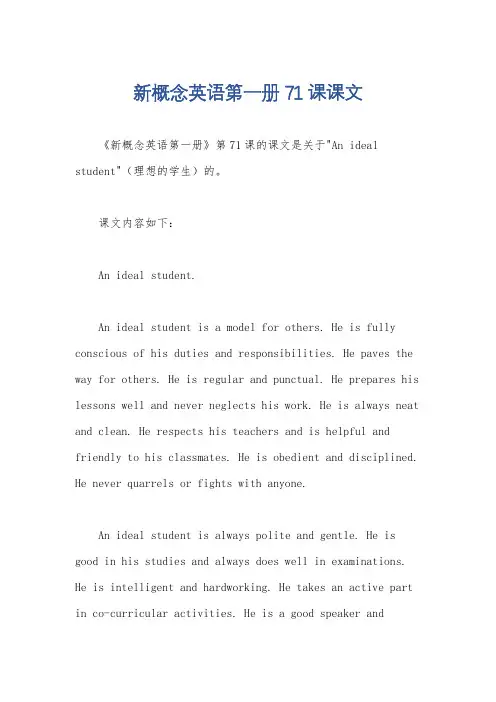
新概念英语第一册71课课文《新概念英语第一册》第71课的课文是关于"An ideal student"(理想的学生)的。
课文内容如下:An ideal student.An ideal student is a model for others. He is fully conscious of his duties and responsibilities. He paves the way for others. He is regular and punctual. He prepares his lessons well and never neglects his work. He is always neat and clean. He respects his teachers and is helpful and friendly to his classmates. He is obedient and disciplined. He never quarrels or fights with anyone.An ideal student is always polite and gentle. He is good in his studies and always does well in examinations. He is intelligent and hardworking. He takes an active part in co-curricular activities. He is a good speaker anddebater. He is also good in sports and games. He is a well-rounded personality.An ideal student is ambitious and has a clear vision of his future. He sets goals for himself and works hard to achieve them. He is focused and determined. He knows the importance of education and strives for excellence in his academic pursuits. He is self-motivated and never gives up easily.An ideal student is not only concerned about his own growth but also about the welfare of others. He is kind and compassionate. He helps those in need and participates in social service activities. He is aware of the issues and challenges faced by society and actively contributes to its betterment.In conclusion, an ideal student is a role model for others. He possesses qualities like discipline, dedication, intelligence, and compassion. He strives for excellence in all aspects of life and works towards personal growth as well as the betterment of society.以上是《新概念英语第一册》第71课的课文内容。
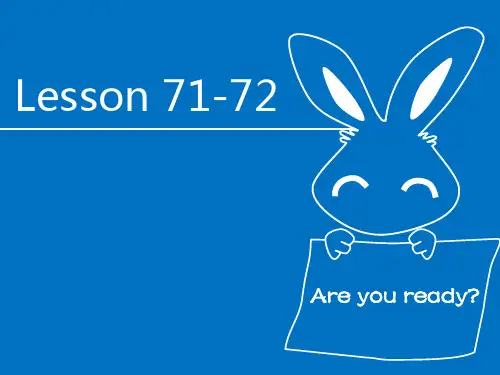
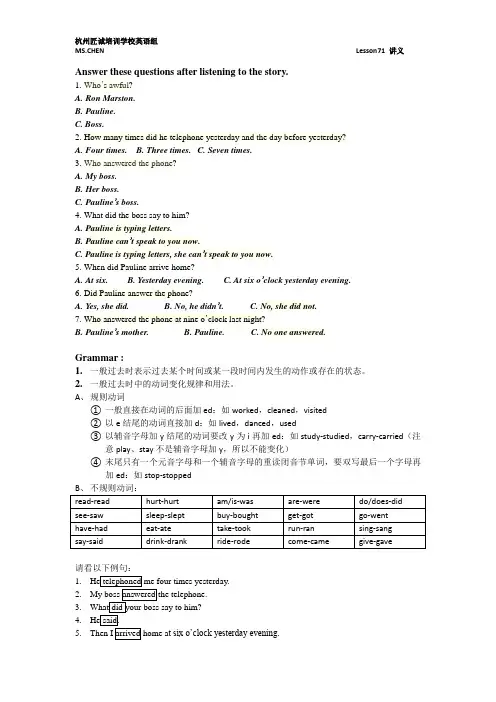
Answer these questions after listening to the story.1.Who’s awful?A.Ron Marston.B.Pauline.C. Boss.2.How many times did he telephone yesterday and the day before yesterday?A.Four times.B. Three times.C. Seven times.3.Who answered the phone?A.My boss.B.Her boss.C.Pauline’s boss.4.What did the boss say to him?A.Pauline is typing letters.B.Pauline can’t speak to you now.C. Pauline is typing letters, she can’t speak to you now.5.When did Pauline arrive home?A.At six.B. Yesterday evening.C. At six o’clock yesterday evening.6.Did Pauline answer the phone?A.Yes, she did.B. No, he didn’t.C. No, she did not.7.Who answered the phone at nine o’clock last night?B.Pauline’s mother. B. Pauline.C. No one answered.Grammar :1.一般过去时表示过去某个时间或某一段时间内发生的动作或存在的状态。
2.一般过去时中的动词变化规律和用法。
A、规则动词①一般直接在动词的后面加ed:如worked,cleaned,visited②以e结尾的动词直接加d:如lived,danced,used③以辅音字母加y结尾的动词要改y为i再加ed:如study-studied,carry-carried(注意play、stay不是辅音字母加y,所以不能变化)④末尾只有一个元音字母和一个辅音字母的重读闭音节单词,要双写最后一个字母再加ed:如stop-stopped请看以下例句:1.2.3.4.5.Exercise:根据括号里的词填空1.I________________(be) at home yesterday.2.She_________________(call) the doctor the night before last.3.She_______________(not open) the box last night.4.It______________(rain) heavily yesterday.5.He_______________(arrive) home very late this morning. 按要求写出动词正确形式。
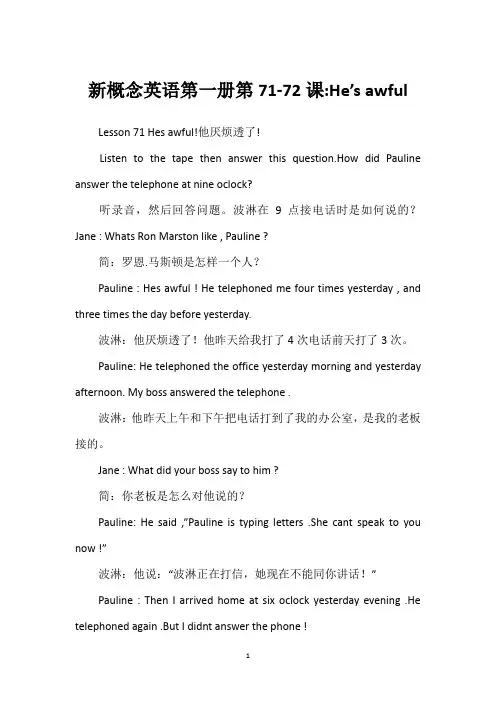
新概念英语第一册第71-72课:He’s awfulLesson 71 Hes awful!他厌烦透了!Listen to the tape then answer this question.How did Pauline answer the telephone at nine oclock?听录音,然后回答问题。
波淋在9点接电话时是如何说的?Jane : Whats Ron Marston like , Pauline ?简:罗恩.马斯顿是怎样一个人?Pauline : Hes awful ! He telephoned me four times yesterday , and three times the day before yesterday.波淋:他厌烦透了!他昨天给我打了4次电话前天打了3次。
Pauline: He telephoned the office yesterday morning and yesterday afternoon. My boss answered the telephone .波淋:他昨天上午和下午把电话打到了我的办公室,是我的老板接的。
Jane : What did your boss say to him ?简:你老板是怎么对他说的?Pauline: He said ,”Pauline is typing letters .She cant speak to you now !”波淋:他说:“波淋正在打信,她现在不能同你讲话!”Pauline : Then I arrived home at six oclock yesterday evening .He telephoned again .But I didnt answer the phone !波淋:后来,我昨晚6点钟回到家里。
他又打来电话,但我没接。
Jane : Did he telephone again last night ?简:他昨夜里又打电话了吗?Pauline : Yes , he did . He telephoned at nine oclock .波淋:是的,打了。


